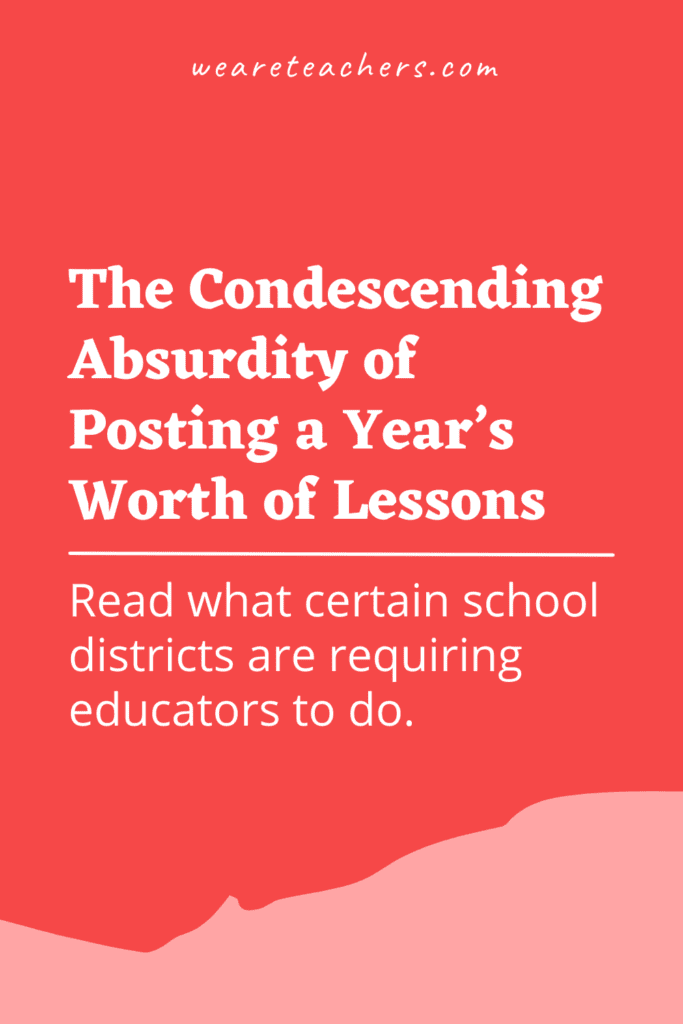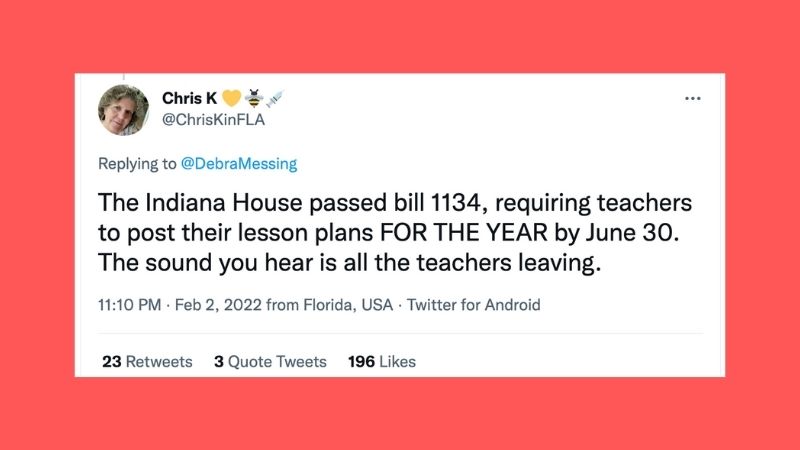Unless you’ve taught in a classroom, you really have no idea what teachers do and how they work. And yet, teaching is one of the only professions where it’s somehow okay for non-teachers to tell teachers how to do their jobs. So, you can only imagine how I felt when I first started hearing about legislation that would require teachers to post an entire YEAR’s worth of curriculum before school even starts. The most recent example is Bill 1134 in Indiana, which has passed the state House and moved onto the Senate committee. But there have been similar bills on the table in Arizona, North Carolina, and other states. If you haven’t seen teachers on TikTok and other social media platforms explaining why this is such a bad idea, let me explain.
You can’t plan for students you haven’t met yet
The summer I landed my first teaching job, I was over the moon. I couldn’t wait to start planning. I spent the summer writing lesson plans, gathering materials, and planning routines and procedures. Oh, what a rookie mistake! When school started, I quickly realized that everything I planned took much longer than I thought it would. And my students weren’t ready for a lot of it. I ended up scrapping most of my plans rather than pushing them forward. I learned a powerful lesson that even though I was teaching eighth grade English, my students were all at very different places with the topics and skills in the curriculum. We can’t use the same curriculum with no changes or modifications year after year.
Teachers differentiate and personalize instruction
This is what I want every non-teacher to know. Teachers don’t show up at school, stand in front of the room, and teach the same lesson over and over again. When you teach, you have a plan, but you know that you’ll make in-the-moment adjustments. This is why teaching is so challenging and so rewarding. It’s also why we need to stop telling teachers how to do their jobs. Unless you are the teacher, you don’t know what’s best for the kids in that room. It takes several months to really get to know the kids, to pre-assess what they know, and determine what they still need to learn. If we have to plan all of our lessons in advance and submit them before school even starts, we are wasting teachers’ time. Plus, families are previewing materials we will likely need to change in order to teach their kids best.
[contextly_auto_sidebar]
These bills are a dodge for the real DEI conversations we need to be having
Bill 1134 in Indiana also explicitly bans the teaching of race, gender, and ethnicity. But some of the other bills are similar attempts to ban these types of conversations in disguise. And they put a ridiculous burden on teachers to solve a conflict that really needs to be tackled through conversation and education within our communities. I believe in being honest with my students and not shying away from difficult conversations or moments in history. I believe in honoring who my students are and providing reading materials that reflect and extend their understanding of identity. And I worry that if bills like the one in Indiana gain traction, what’s considered “controversial” will only continue to grow, and teachers will be forced to censor themselves for fear of losing their jobs.
Engagement is higher when curriculum is a conversation
I used to say this to my kids all the time. Look, I know what skills and topics I want to teach you, but how we get there is up to us. Curriculum is a conversation. When I found out that my students loved Taylor Swift’s music, I used the lyrics to teach them figurative language. Did I know that I was going to do that in August? No. This is why we have standards and learning objectives. Sure, let’s share the skills and topics we are going to teach. In fact, just look up your state standards or the Common Core. But when it comes to the details like the books we choose or the videos we create or the games we play, that is a decision we make in the moment and can’t always plan for.
Teachers don’t need to be micromanaged
Teaching is the hardest job I’ve ever had, and I worked hard to become a teacher. If I needed guidance or had questions about how to do my job, I asked the teacher down the hall. And while I fully agree that parent-teacher collaboration is important, and when we work together, we can really help our kids succeed, I don’t think that teachers need to be micromanaged or told how to do their jobs by people who have never taught or aren’t trained teachers. And if we do want to rethink education policy, how about we ask a teacher before we craft a policy that will actually do more harm than good for our kids’ education? Now that’s something I’d vote yes for.
Do you think we need to stop telling teachers how to do their jobs? What do you think? Come and share in our WeAreTeachers HELPLINE group on Facebook.
Plus, how teachers are creating boundaries right now.


